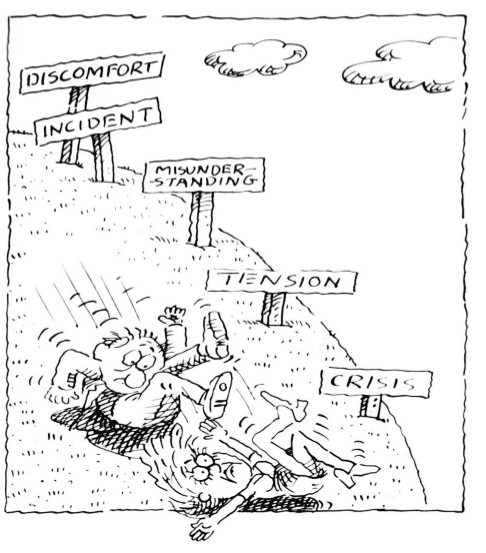There is no ideal time or location in a retail environment to have interpersonal conflict with others, and when they do occur most people will put off a conflict discussion with a colleague or their Manager. Ultimately, it’s because people think they have more to lose than gain from having such a discussion. More specifically, it includes the fact that some people:
- View conflict as all bad. These people shy away from debates and disagreements in order to protect themselves
- Display aggressive, fast-talking and intimidating tactics in a conflict discussion that makes the other person feel awkward and embarrassed. They therefore choose to avoid these people
- Become emotional or irrational in conflict discussions and lack the clear-thinking skills to think on their feet and manage the discussion assertively
- Believe that the other person won’t change so therefore why bother
- Feel uncomfortable with the fact that they must work with these people every day and therefore the pain of a discussion gone wrong is too much of a risk.
The best way to manage workplace conflicts is to minimise misunderstandings.
”People don’t get along because they fear each other. People fear each other because they don’t know each other. They don’t know each other because they have not properly communicated to each other.” Martin Luther King Jr
This quote clearly illustrates that conflict is often linked to ineffective communication. Therefore, to minimise misunderstandings there are some things retailers should focus on as a team;
- Create an environment where open communication is encouraged
- Discourage aggressive communication and hold each other accountable for this
- Practice truly listening to each other whether it is a team meeting or just during your shift, interrupting, talking over the top of someone else is often a cause of workplace conflict
- Be clear as a team about everyone’s’ roles and responsibilities and levels of authority
- Have lunch with different members of your team to get to know them
- Pay attention to cultural differences and value them
Signs of workplace conflict
Unfortunately, often when a workplace conflict is not handled quickly when it is a small issue, it will lie dormant and eventually explode into a much larger issue than it needed to be, destroying relationships and trust.
Each conflict is different. But all conflicts will gain momentum the longer they are allowed to exist and become much harder to deal with. This is why it is so important to stay alert to signs of potential or underlying conflict, so you can get on top of it early and ‘nip it in the bud’!
The Conflict Curve
The Conflict Curve is a great tool that will assist you in understanding the signs of conflict. Th
Conflict Clues
- Discomfort: At this first stage, things don’t feel right. Perhaps nothing has been said yet, but it may be difficult to identify what the problem is.
- Incident: At this stage, there may have been a short, sharp exchange, without any lasting internal reaction.
- Misunderstanding: Here, motives or facts are often confused or misunderstood.
- Tension: Here relationships are weighed down by negative attitudes and fixed opinions.
- Crisis: At this last stage, behaviour is affected, normal functioning becomes difficult, extreme gestures are contemplated or executed.
Conflict resolution
Think of conflict resolution, as reaching a joint understanding. You are trying to create a win-win for both people involved. Here are some tips to help you reach agreements with other team members:
- Act, don’t react: pause and think what outcome do I want, how can I achieve it?
- Focus on problem solving: see the disagreement as a problem to solve, not a battle to win
- Emphasise the relationship: clearly state that you want a continuing good relationship
- Respect the other person: Put-downs and personal attacks lessen the likelihood of a resolution
- Use empathy: putting yourself in the other person’s shoes will help you to understand their perspective and behaviour even if you want them to change it
Conflict planning questions
Sometimes when you are going to have a difficult conversation with another team member it is a good idea to jot down a few notes, so that you are clear and feel more confident before starting the conversation.
1. What are the facts surrounding this situation?
2. What are the critical issues for me?
3. What appears to be the significant differences in the way we both see this issue?
4. Who can l consult in advance to get some advice or further information?
5. What options or solutions are available for solving this situation? Given the situation, which options or solutions will I recommend?
6. How is this person likely to react? What will l do if the other person becomes angry, defensive and emotional or denies there’s a problem?
7. What questions will I ask to encourage involvement?
8. What will I do to remain positive and in control of my emotions?
How do you manage workplace conflicts? The ARA Retail Institute provides industry leading workshops for sales and service excellence.
{{cta(‘719f43c5-a1ce-4270-8f04-6e727af1e258′,’justifyleft’)}} {{cta(‘cc1c3b73-b8d0-4ede-bbf2-bafb27cf85f7′,’justifyleft’)}}{{cta(‘0e723ced-7559-4d17-8148-b2bd1baec021′,’justifyleft’)}}
Find more information about the services provided by The ARA Retail Institute here.




















